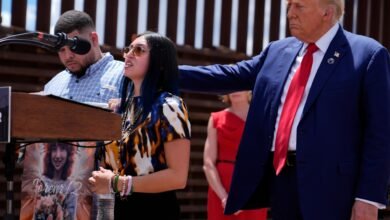Don’t be surprised by the B.C. NDP consumer carbon tax step back

In 2008, as the-then B.C. Liberal government was poised to bring in Canada’s first carbon tax, the B.C. NDP staunchly opposed it, saying a climate plan should not tax consumers but target major industrial producers such as the gas, oil, cement and aluminum industries.
It even used a slogan now popular among Conservative politicians in Canada: “Axe the Tax.”
The lookback provides context to B.C. Premier David Eby’s decision to end nearly two years of publicly supporting the carbon tax in the province, with experts saying embracing the tax scheme doesn’t trump political risk.
On Thursday, Eby announced his government would pull its consumer carbon tax, which has been in place for 16 years, and shift the burden of limiting climate change to “big polluters” if Ottawa ended legal obligations for the tax nationwide.
Eby’s argument is the same one the B.C. NDP made in 2008 under then-leader Carole James, who argued such a tax scheme would be a burden to consumers facing high costs.
A CBC News story from June 2008 said the price of gas was approaching $1.50 per litre. B.C.’s carbon tax, implemented by then-premier Gordon Campbell, introduced a $2.4-cents-a-litre tax on gasoline in July of that year.
Canadian Centre for Policy Alternatives senior economist Marc Lee wrote in 2008 about the NDP’s ‘axe the tax’ campaign. He said it was done to create a wedge issue between the party and the B.C. Liberals for the 2009 provincial election.
“And it failed,” he said. Campbell’s Liberals won the 2009 election over Carole James’s NDP.
Lee said the B.C. NDP came to embrace carbon pricing when it gained power after the 2017 election. It began ramping up rates in tandem with the federal government, which created a floor on carbon pricing throughout the country.
Carbon taxes add additional prices to the purchase of fossil fuels to try to push consumers to greener options. The schemes return revenue back to residents through tax credits.
The idea is to increase them over time, pushing consumers to take action to avoid it over the long term, such as buying an EV or installing heat pumps in homes.
Premier David Eby says B.C. would scrap the consumer carbon tax if the federal government removes the legal backstop that forces provinces to collect the tax. The B.C. Conservatives are taking credit for the move while the B.C. Greens say it’s a backwards step.
For most of Eby’s two years as premier, he’s defended the scheme as a key tool in limiting climate change.
In March, he called out federal Opposition Conservative Leader Pierre Poilievre, who asked premiers to oppose an April 1 increase to the tax, which resulted in an extra 18 cents on a litre of fuel.
At the time, he called Poilievre’s war against the federal carbon tax a “baloney factory.”
But that all changed on Thursday, according to Eby, because the taxes have now been politicized. He’s about to enter a much-closer-than-anticipated electoral race with B.C. Conservative Leader John Rustad, who has promised to get rid of the tax in B.C.
The carbon tax has steadily risen to $80 per tonne of CO2 equivalent (tCO2e), and opponents say it’s a financial burden for residents struggling with the increasing cost of living.
University of the Fraser Valley political scientist Hamish Telford did not call Eby’s decision a flip-flop but rather pragmatic decision-making, considering a federal cancellation of a carbon tax would make B.C. an outlier.
“B.C. could not continue to be the only jurisdiction in North America with such a tax. It would just not be economically feasible,” he said. “B.C. just can’t go it alone.
“[Eby’s] clearing the decks on that now.”
‘Starting to fold’
Despite being a political punching bag on affordability, research shows that carbon pricing is not a significant driver of the rising cost of living.
Overall, economists like Lee say carbon taxes are often poorly explained by governments and understood by voters, making them a political target.
“Carbon taxes at the end of the day are difficult politically even though they’re sort of uniformly endorsed by economists and climate policy experts,” said Lee. “What we’ve seen is governments starting to fold on carbon tax.”
In B.C., taxpayers get quarterly rebates to offset its cost.
Poilievre says he will overturn the federal Liberal’s carbon tax if he is elected in the next federal election, which is to take place sometime before Oct. 20, 2025.
With the B.C. NDP signaling it intends to back away depending on the results of the next federal election, Eby’s federal counterpart, NDP Leader Jagmeet Singh, has been noncommittal about his support. He said his party is working on a different plan that doesn’t burden working people.
Meanwhile, UBC Sauder School of Business energy economics professor Werner Antweiler said all the furor, so far, hasn’t included what an alternative to consumer carbon pricing would be to help tackle the problem of climate change.
“I think the federal government failed badly in their marketing of the policy. Be that as it may, the populist ‘axe the tax’ approach misses the second part … but what is next?’,” wrote Antweiler in an email to CBC News.
Source link




